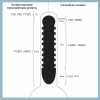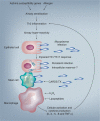New insights into the pathogenesis and detection of Mycoplasma pneumoniae infections
- PMID: 19072181
- PMCID: PMC2633477
- DOI: 10.2217/17460913.3.6.635
New insights into the pathogenesis and detection of Mycoplasma pneumoniae infections
Abstract
Mycoplasma pneumoniae is a common cause of upper and lower respiratory tract infections in persons of all ages and may be responsible for up to 40% of community-acquired pneumonias. A wide array of extrapulmonary events may accompany the infections caused by this organism, related to autoimmunity or direct spread. This review includes a discussion of the latest knowledge concerning the molecular pathological basis of mycoplasmal respiratory disease, how the organism interacts with the host immune system and its association with the development of chronic conditions such as asthma, recent emergence of macrolide resistance and the status of laboratory diagnostic methods.
Figures



References
-
- Waites KB, Talkington DF. Mycoplasma pneumoniae and its role as a human pathogen. Clin. Microbiol. Rev. 2004;17(4):697–728. [of considerable interestComprehensive review of all aspects of human infections owing to Mycoplasma pneumoniae that includes in-depth discussions of clinical and epidemiological aspects as well as diagnostic strategies.] - PMC - PubMed
-
- Krause DC, Balish MF. Cellular engineering in a minimal microbe: structure and assembly of the terminal organelle of Mycoplasma pneumoniae. Mol. Microbiol. 2004;51(4):917–924. - PubMed
-
- Balish MF. Subcellular structures of mycoplasmas. Front. Biosci. 2006;11:2017–2027. - PubMed
-
- Balish MF, Krause DC. Mycoplasmas: a distinct cytoskeleton for wall-less bacteria. J. Mol. Microbiol. Biotechnol. 2006;11(3−5):244–255. [of interestDescribes the mycoplasmal cytoskeletal structures and protein components of the attachment organelle and how they might interact and contribute to its various functions. These processes are essential for cytadherence, the primary virulence factor responsible for M. pneumoniae respiratory disease.] - PubMed
Publication types
MeSH terms
Substances
Grants and funding
LinkOut - more resources
Full Text Sources
Other Literature Sources
